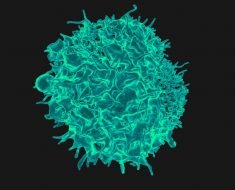Liver disease: Doctor discusses causes and symptoms
We use your sign-up to provide content in ways you’ve consented to and to improve our understanding of you. This may include adverts from us and 3rd parties based on our understanding. You can unsubscribe at any time. More info
One of these symptoms can appear on the scales; unexplained weight loss can be a symptom of NAFLD.
Other symptoms include:
• A dull or aching pain in the top right of the tummy
• Extreme tiredness
• Weakness.
Furthermore, if the most advanced stage of the condition (cirrhosis) develops, more severe symptoms such as jaundice, itchy skin, and swelling in the legs, ankles, and feet can occur.

NAFLD will normally be diagnosed after a blood test or an ultrasound.
This is because the blood test does not always pick up the condition.
A biopsy may also be required.
This occurs when a small piece of liver tissue is taken using a needle.
There are a number of ways NAFLD can be treated.
If it’s caught early, most will not develop serious issues, but it is suggested a person takes steps to stop it becoming worse.
At the moment, says the NHS: “There’s currently no specific medication for NAFLD, but making healthy lifestyle choices can help.
“Treatment also may be recommended for associated conditions or complications.”

Other treatments include medications and a liver transplant.
A number of factors can increase a person’s risk of developing the condition such obesity, the presence of type 2 diabetes, having a condition that affects how the body uses insulin, an underactive thyroid, or high blood pressure.
Furthermore, the presence of high cholesterol, metabolic syndrome, an advanced age over 50, and having a smoking habit will also increase the risk of NAFLD.
While these factors increase the risk of developing the condition, it is still possible for young people without these risk factors to develop the condition.

Meanwhile, alcohol-related liver disease (ARLD) is a form of the condition linked to excess alcohol consumption.
Symptoms of ARLD include:
• Feeling sick
• Weight loss
• Loss of appetite
• Jaundice
• Swelling in the ankles and tummy
• Confusion or drowsiness
• Vomiting blood
• Passing blood in the stools.
For more information on liver disease contact the NHS or consult with your GP.
Source: Read Full Article





